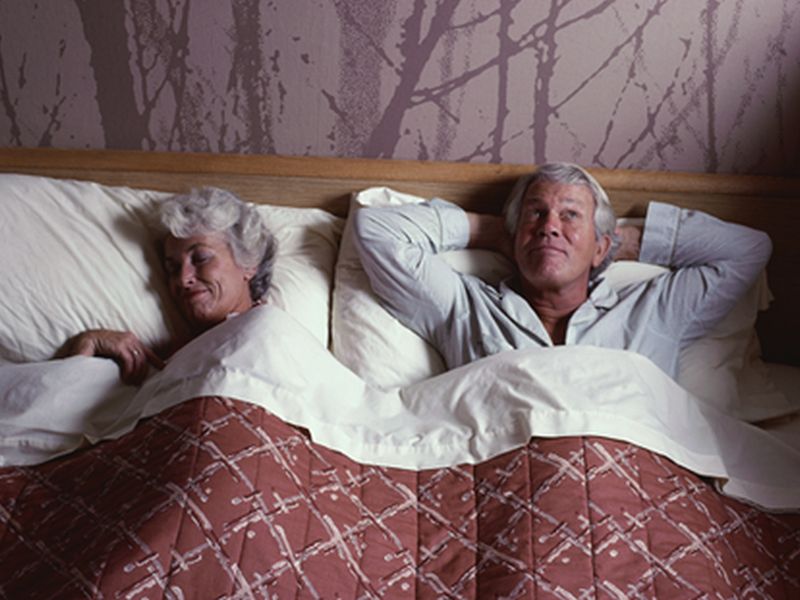|
Health Tip: Suggestions For a Better Night's Sleep

A new analysis of 11 studies that included a total of more than 1 million adults without heart disease suggests the sweet spot is six to eight hours a night. The studies were published within the past five years.TUESDAY, Aug. 28, 2018 (HealthDay News) -- When it comes to sleep, people seem to have different needs. But how much sleep is best for your heart?
The researchers compared adults who slept between six and eight hours to others. Adults who slept less or more than that were, respectively, 11 percent and 33 percent more likely to develop or die from heart disease or stroke during an average follow-up of 9.3 years, the findings showed.
The report was presented Sunday at a European Society of Cardiology meeting in Munich, Germany. Research presented at meetings should be considered preliminary until published in a peer-reviewed journal.
"We spend one-third of our lives sleeping, yet we know little about the impact of this biological need on the cardiovascular system," study author Dr. Epameinondas Fountas said in a society news release. Fountas works at the Onassis Cardiac Surgery Center in Athens, Greece.
"Our findings suggest that too much or too little sleep may be bad for the heart. More research is needed to clarify exactly why, but we do know that sleep influences biological processes like glucose metabolism, blood pressure, and inflammation -- all of which have an impact on cardiovascular disease," Fountas said.
"Having the odd short night or lie-in is unlikely to be detrimental to health, but evidence is accumulating that prolonged nightly sleep deprivation or excessive sleeping should be avoided," Fountas said.
There are, he said, plenty of ways to establish good sleep habits. Among them: Going to bed and getting up at the same time every day; avoiding alcohol and caffeine before bed; eating a healthy diet; and being physically active.
"Getting the right amount of sleep is an important part of a healthy lifestyle," Fountas concluded.
-- Robert Preidt

Copyright © 2018 HealthDay. All rights reserved.
CONTINUE SCROLLING FOR NEXT NEWS ARTICLE
SOURCE: European Society of Cardiology, news release, Aug. 26, 2018
Here's How Sleepless Nights Can Trigger Weight Gain
 By Amy Norton
By Amy NortonHealthDay Reporter
FRIDAY, Aug. 24, 2018 (HealthDay News) -- One sleepless night might tip the body's metabolism toward storing fat while depleting muscle, new research suggests.
Many studies have linked poor sleep -- whether from insomnia or working the night shift -- to weight gain and health conditions like type 2 diabetes. But that type of research leaves open the question of whether sleep loss itself is to blame.
A growing number of lab studies, zeroing in on the effects of sleep deprivation, suggest the answer is "yes." The new research adds to the evidence.
"We need mechanistic studies to understand the effects of sleep loss," said lead researcher Dr. Jonathan Cedernaes, a research associate at Northwestern University, in Chicago.
Cedernaes said studies have shown, for example, that sleep loss can change a range of markers in the blood -- including blood sugar, hormone levels and various byproducts of metabolism.
For the new study, his team dug into the effects within fat and muscle tissue -- looking at how gene activity and protein levels in those tissues changed after a sleepless night.
The investigators found that in 15 young, healthy men, one night of sleep loss triggered changes that favored fat storage and muscle breakdown.
"This doesn't mean you should be alarmed by one night of sleep loss," Cedernaes stressed. But, he added, the study raises the question of what would happen if poor sleep becomes a regular pattern.
The findings were published online Aug. 22 in the journal Science Advances.
A sleep researcher who was not involved in the study called the findings "extremely important."
"The finding that skeletal muscle proteins decrease, and [fat-promoting] proteins increase, in response to sleep loss is a novel mechanism by which sleep loss may promote obesity and weight gain," said Josiane Broussard, an assistant professor at Colorado State University, in Fort Collins.
With any lab study, however, it's not clear how well the artificial conditions reflect real life.
Dr. Eva Szentirmai, an associate professor at Washington State University, in Spokane, who studies sleep and metabolism, said, "We don't know if you would observe similar tissue-specific changes during long-term, habitual sleep loss -- which is common in our society."
In addition, the experiment did not fully capture what it's like to work at night, for example.
The volunteers spent two nights in the sleep lab: on one night, they could sleep for up to 8.5 hours; on the other night, they were kept awake all night, but had to stay in bed.
The point, Cedernaes explained, was to isolate the metabolic effects of sleep loss itself.
But in real life, someone working the night shift would be physically and mentally active, eating and going about life during the part of the day when humans normally sleep.
In addition, Szentirmai pointed out, they would be exposed to irregular lighting patterns. And changes in light and eating patterns may directly affect "muscle protein balance," she said.
So, she noted, it's possible that night-shift work could add to any negative effects of sleep loss on muscle and fat tissue.
What about those who simply stay up late and don't get enough sleep? Szentirmai said studies have shown that those people tend to gain more weight over time, and have higher risks of obesity, versus well-rested people.
But, she added, those studies don't prove cause and effect.
Cedernaes pointed to the bigger picture: Sleep has an important impact on overall health, and people need to get enough of it. Individuals vary in how much sleep they need, he said. But in general, it's recommended that adults get seven to nine hours each night.
If you work at night and must sleep irregular hours, Cedernaes said, try to be particularly vigilant about other lifestyle habits -- like eating a healthy diet and getting regular exercise.
According to Broussard, research like this could eventually help shift workers and others who cannot avoid irregular sleep hours. If researchers understand exactly how sleep disruptions affect the body, she said, they might identify specific ways to counter those effects.

Copyright © 2018 HealthDay. All rights reserved.
CONTINUE SCROLLING FOR NEXT NEWS ARTICLE
SOURCES: Jonathan Cedernaes, M.D., Ph.D., research associate, endocrinology, metabolism and molecular medicine, Northwestern University Feinberg School of Medicine, Chicago; Josiane Broussard, Ph.D., assistant professor, health and exercise science, Colorado State University, Fort Collins; Eva Szentirmai, M.D., Ph.D., associate professor, biomedical science, Washington State University Elson S. Floyd College of Medicine, Spokane, Wash.; Aug. 22, 2018, Science Advances, online
Sleep Deprivation May Play Role in 'Global Loneliness Epidemic'

A series of experiments revealed sleep-deprived people feel lonelier and less eager to engage with others. That, in turn, makes others less likely to want to socialize with the sleep-deprived, researchers said.TUESDAY, Aug. 14, 2018 (HealthDay News) -- Sleep problems can play havoc with your social life, a new study suggests.
The researchers also found that well-rested people feel lonely after spending just a short time with a sleep-deprived person, which suggests that social isolation caused by sleep problems may be contagious, according to the investigators at the University of California, Berkeley.
These findings are the first to show a two-way link between poor sleep and social isolation, offering new insight into what the researchers called a global loneliness epidemic.
"We humans are a social species. Yet sleep deprivation can turn us into social lepers," study senior author Matthew Walker said in a university news release. He is a professor of neuroscience and psychology.
Brain scans of sleep-deprived people watching videos of strangers walking toward them showed heightened activity in networks typically activated when people feel their personal space is being invaded, the researchers found.
Sleep deprivation also reduced activity in brain regions that normally encourage social engagement, the findings showed.
"The less sleep you get, the less you want to socially interact. In turn, other people perceive you as more socially repulsive, further increasing the grave social-isolation impact of sleep loss," Walker explained.
"That vicious cycle may be a significant contributing factor to the public health crisis that is loneliness," he added.
Surveys suggest that nearly half of Americans feel lonely or left out. And loneliness increases the risk of early death by more than 45 percent, double the risk associated with obesity, research shows.
According to study lead author Eti Ben-Simon, "It's perhaps no coincidence that the past few decades have seen a marked increase in loneliness and an equally dramatic decrease in sleep duration." She is a postdoctoral fellow in Walker's Center for Human Sleep Science.
"Without sufficient sleep, we become a social turn-off, and loneliness soon kicks in," Ben-Simon said.
The study did offer a reason for optimism: A good night's sleep makes a rapid difference.
Walker said that "just one night of good sleep makes you feel more outgoing and socially confident, and furthermore, will attract others to you."
The study was published Aug. 14 in the journal Nature Communications.
-- Robert Preidt

Copyright © 2018 HealthDay. All rights reserved.
CONTINUE SCROLLING FOR NEXT NEWS ARTICLE
SOURCE: University of California, Berkeley, news release, Aug. 14, 2018
Sound Advice for a Sound Sleep
 By Len Canter
By Len CanterHealthDay Reporter
MONDAY, June 25, 2018 (HealthDay News) -- Insomniaaffects up to 15 percent of Americans, but sleeping pills aren't the only -- or the best -- answer. A good sleep routine, exercise and mindfulness are all options to get the restorative sleep you need.
Set up a daily sleep pattern by going to bed at the same time each night and waking up at the same time each morning. Yes, even on the weekends. Keep your bedroom peaceful, dark and on the cool side. Take out all electronics, and stop using them at least one hour before you turn in. They emit a type of light that interferes with your natural body rhythms, prompting you to stay alert when you should be winding down.
Exercising vigorously in the morning leads to better sleep at night. But if your only free time is later in the day, such workouts don't seem to interfere with sleep as previously thought.
Stubborn sleeplessness may respond to mindfulness meditation, which can focus specifically on insomnia or stress reduction. Mindfulness techniques can target the thought patterns that perpetuate insomnia. According to research, working with a therapist and practicing meditation at home for 30 to 45 minutes nearly every day helps people get better sleep. And there are also self-help books available if you want to try it on your own.
When these techniques aren't enough to overcome insomnia and get you the sleep you need, you may want to investigate cognitive behavioral therapy, or CBT. By working with this type of trained therapist, you'll learn how to change the negative thoughts that could be at the root of your sleep problem. In fact, there are CBT techniques aimed specifically at insomnia.

Copyright © 2018 HealthDay. All rights reserved.
CONTINUE SCROLLING FOR NEXT NEWS ARTICLE
Health Tip: Suggestions For a Better Night's Sleep
(HealthDay News) -- Not getting enough sleep? It's probably hurting your health.
Go to bed and wake up at the same time every day, even on weekends.The U.S. National Institute of Neurological Disorders and Stroke suggests how to improve your sleep:
- Exercise for at least 20 minutes a day. But don't exercise just before bedtime.
- Avoid nicotine, caffeine and alcohol before bedtime.
- Set a relaxing routine before bed, such as taking a bath, reading or meditating.
- Maintain a cool and comfortable temperature in your bedroom.
- Do not watch TV or use any other electronic devices just before bed.
- If you cannot fall asleep, do not lie in bed for a long time awake. Instead, read a book or listen to music until fatigue sets in.
- If you often have trouble falling asleep or staying asleep, see a doctor.


মন্তব্যসমূহ
একটি মন্তব্য পোস্ট করুন